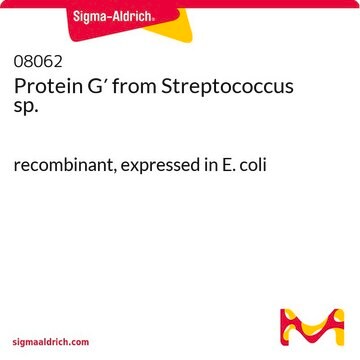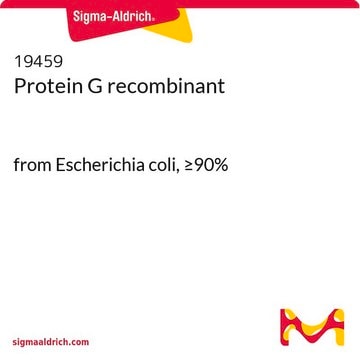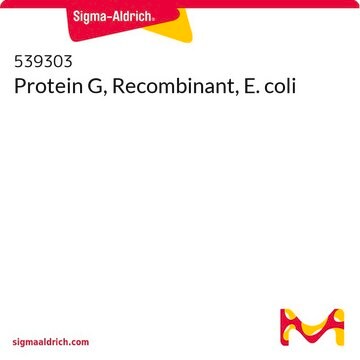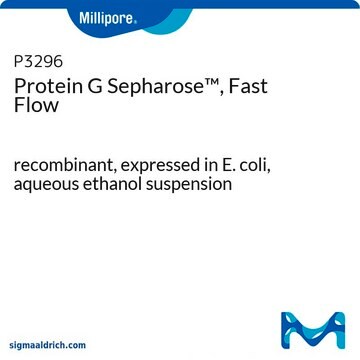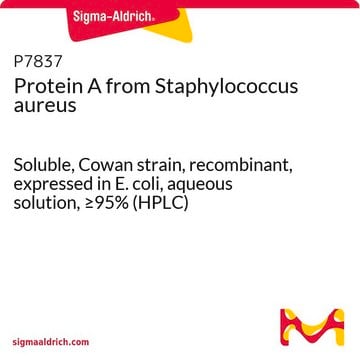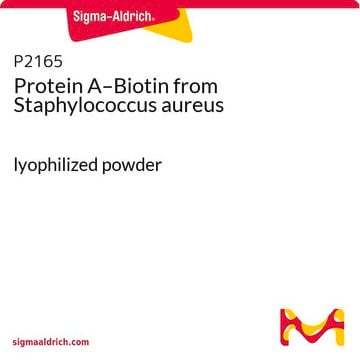P4689
Protein G′ from proprietary source
recombinant, expressed in E. coli, lyophilized powder
Synonyme(s) :
G′ protein
Se connecterpour consulter vos tarifs contractuels et ceux de votre entreprise/organisme
About This Item
Code UNSPSC :
12352203
Nomenclature NACRES :
NA.46
Produits recommandés
Produit recombinant
expressed in E. coli
Niveau de qualité
Conjugué
unconjugated
Forme
lyophilized powder
Capacité
~5 mg/mg, solid binding capacity (IgG)
Température de stockage
−20°C
Description générale
Genetically engineered truncated protein G; retains affinity for IgG, but lacks albumin- and Fab- binding sites and membrane-binding regions.
Protein G is a group G Streptococcus protein and is a large multi-domain cell wall protein. It interacts with the Fc region of IgG (immunolglobulin) through its repeating 55-amino acid domain. Strain GX7809 and GX7805 contain two and three such protein repeats respectively.
Application
Protein G has been used for the analysis of mAb (monoclonal antibody) synergy towards hCG (human chorionic gonadotropin) using surface plasmon resonance (SPR), and for serum IgG galactosylation obtained from RA (rheumatoid arthrtitis) patients and MRL-lpr mice.
Actions biochimiques/physiologiques
Protein G is implicated in the evasion of host defence response by Streptococcus, via its protein binding properties. It is interacts with α2-micorglobulin which is a predominant inhibitor of human plasma.
Forme physique
Lyophilized from water.
Clause de non-responsabilité
Unless otherwise stated in our catalog or other company documentation accompanying the product(s), our products are intended for research use only and are not to be used for any other purpose, which includes but is not limited to, unauthorized commercial uses, in vitro diagnostic uses, ex vivo or in vivo therapeutic uses or any type of consumption or application to humans or animals.
Code de la classe de stockage
11 - Combustible Solids
Classe de danger pour l'eau (WGK)
WGK 3
Point d'éclair (°F)
Not applicable
Point d'éclair (°C)
Not applicable
Équipement de protection individuelle
Eyeshields, Gloves, type N95 (US)
Certificats d'analyse (COA)
Recherchez un Certificats d'analyse (COA) en saisissant le numéro de lot du produit. Les numéros de lot figurent sur l'étiquette du produit après les mots "Lot" ou "Batch".
Déjà en possession de ce produit ?
Retrouvez la documentation relative aux produits que vous avez récemment achetés dans la Bibliothèque de documents.
Les clients ont également consulté
C R Goward et al.
The Biochemical journal, 267(1), 171-177 (1990-04-01)
The gene for Protein G from Streptococcus strain G148 was cloned and expressed in Escherichia coli. The regions on the gene corresponding to the albumin-binding domains and the Fab-binding region were then deleted by site-directed mutagenesis. The translation of regions
Arie Ryvkin et al.
PloS one, 7(8), e41469-e41469 (2012-08-08)
Polyclonal serum consists of vast collections of antibodies, products of differentiated B-cells. The spectrum of antibody specificities is dynamic and varies with age, physiology, and exposure to pathological insults. The complete repertoire of antibody specificities in blood, the IgOme, is
Thomas Pausch et al.
Pancreas, 47(5), 561-567 (2018-04-24)
Defensins are antimicrobial peptides playing a role in innate immunity, in epithelial cell regeneration, and in carcinogenesis of inflammation-triggered malignancies. We analyzed this role in pancreatic ductal adenocarcinoma (PDAC) in the context of its association with chronic pancreatitis (CP). Human
Oleksiy Krupin et al.
Sensors (Basel, Switzerland), 19(3) (2019-02-06)
Straight long-range surface plasmon-polariton (LRSPP) waveguides as biosensors for label-free detection are discussed. The sensors consist of 5-μm-wide 35-nm-thick gold stripes embedded in a low-index optical-grade fluoropolymer (CYTOPTM) with fluidic channels etched to the Au surface of the stripes. This
T Klonisch et al.
Immunology, 89(2), 165-171 (1996-10-01)
The effects of orientating pairs of synergistic monoclonal antibodies (mAb) on binding of human chorionic gonadotropin (hCG) was studied by radioimmunoassay (RIA), enzyme-linked immunosorbent assay (ELISA) and surface plasmon resonance (SPR). Antibody synergy towards hCG required two functionally intact antibodies
Notre équipe de scientifiques dispose d'une expérience dans tous les secteurs de la recherche, notamment en sciences de la vie, science des matériaux, synthèse chimique, chromatographie, analyse et dans de nombreux autres domaines..
Contacter notre Service technique